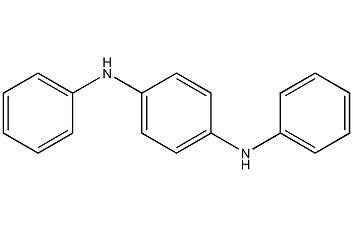
Structural formula
| Business number | 01HG |
|---|---|
| Molecular formula | C18H16N2 |
| Molecular weight | 260.33 |
| label |
Anti-aging agent PPD, diphenyltetraphenyldiamine, 1,4-Diphenylaminobenzene, Antioxidant PPD, 2-phenyl-4-phenyl-diamine, 1,4 – diphenyl benzene, Universal antioxidant |
Numbering system
CAS number:74-31-7
MDL number:MFCD00003015
EINECS number:200-806-4
RTECS number:ST2275000
BRN number:2215944
PubChem number:24867020
Physical property data
1. Properties: gray powder or flakes. Is flammable. The color becomes darker in the air and under light
2. Density (g/mL, 25/4℃): 1.22~1.31
3. Relative vapor density (g/mL, air=1): Uncertain
4. Melting point (ºC): 152
5. Boiling point ( ºC, normal pressure): 282
6. Boiling point (ºC, 0.5mmHg): 220-225
7. Refractive index: Uncertain
8. Flash point (ºC, 1mmHg): 220-225
9. Specific rotation (º): Uncertain
10. Autoignition point or ignition temperature (ºC): Uncertain
11. Vapor pressure (kPa, 25 ºC): Uncertain
12. Saturated vapor pressure (kPa, 60 ºC): Uncertain
13. Heat of combustion (KJ/mol): Uncertain
14. Critical temperature (ºC): Uncertain
15. Critical pressure (KPa): Uncertain
16. The logarithmic value of the oil-water (octanol/water) partition coefficient: Uncertain
17. The upper explosion limit (%, V/V): Uncertain
18. The lower explosion limit (%, V/V): Uncertain
19. Solubility: Soluble in benzene and ethanol, insoluble in gasoline and water (<0.1 g/100 mL at 20 ºC)
Toxicological data
Acute toxicity: rat oral LD50: 2370 mg/kg; mouse oral LD50: 18 mg/kg; mouse intraperitoneal LD50: 300 mg/kg; tumorigenicity: mouse subcutaneous injection TDLo: 1000 mg/kg; breeding : Rat oral TDLo: 450 mg/kgSEX/DURATION: female 14 day(s) pre-mating female 1-22 day(s) after conception; Rat oral TDLo: 2500 mg/kgSEX/DURATION: female 1- 22 day(s) after conception; Mouse oral TDLo: 4176 mg/kgSEX/DURATION: female 6-14 day(s) after conception; Mutagenicity: SandMicrobial test system for Mammalian gene mutation: 10 ug/plate; Hamster lung cytogenetic analysis test system: 1800 ug/L; Hamster lung Mutation in mammalian somatic cellsTEST SYSTEM: 30 mg/L;
Ecological data
None
Molecular structure data
5. Molecular property data:
1. Molar refractive index: 85.00
2. Molar volume (cm3/mol): 221.5
3. Isotonic specific volume (90.2K): 593.9
4. Surface tension (dyne/cm): 51.6
5. Polarizability (10-24cm3): 33.69
Compute chemical data
1. Reference value for hydrophobic parameter calculation (XlogP): None
2. Number of hydrogen bond donors: 2
3. Number of hydrogen bond acceptors: 2
4. Number of rotatable chemical bonds: 4
5. Number of tautomers: none
6. Topological molecule polar surface area 24.1
7. Number of heavy atoms: 20
8. Surface charge: 0
9. Complexity: 231
10. Number of isotope atoms: 0
11. Determine the number of atomic stereocenters: 0
12. Uncertain number of atomic stereocenters: 0
13. Determine the number of chemical bond stereocenters: 0
14. Number of uncertain chemical bond stereocenters: 0
15. Number of covalent bond units: 1
Properties and stability
None
Storage method
Stored in a cool, dry warehouse, protected from fire, moisture and sun.
Synthesis method
Hydroquinone and aniline react under the catalysis of triethyl phosphate for a certain period of time at 280~300℃ and a pressure of 0.7MPa. After the reaction, vacuum distillation was performed. Excess aniline is removed first under low vacuum, and then the intermediate is evaporated under higher vacuum. The remaining materials after steaming the intermediate are sliced, powdered, and packaged to become the finished product. The synthesis reaction is as follows

Purpose
is a general-purpose antioxidant. It has excellent resistance to flexural cracking and has excellent protection against heat, oxygen, ozone, and photoaging, especially copper and manganese damage. It is polluting and will discolor the rubber. It is not suitable for light-colored and bright-colored products. It is often used in the manufacture of various tires and dark-colored products. Because of its low solubility in rubber, it is easy to bloom. Mainly used as rubber antioxidant, suitable for natural rubber, styrene-butadiene rubber, and butadiene rubber. The reference dosage is 0.2 to 0.3 parts by mass.
extended-reading:https://www.bdmaee.net/niax-ef-600-low-odor-balanced-tertiary-amine-catalyst-momentive/extended-reading:https://www.newtopchem.com/archives/category/products/page/123extended-reading:https://www.cyclohexylamine.net/amine-catalyst-dabco-8154-catalyst-dabco-8154/extended-reading:https://www.morpholine.org/acetic-acid-potassium-salt/extended-reading:https://www.bdmaee.net/potassium-acetate-2/extended-reading:https://www.newtopchem.com/archives/44594extended-reading:https://www.morpholine.org/cas-7560-83-0/extended-reading:https://www.cyclohexylamine.net/strong-gel-catalyst-dabco-dc1-delayed-strong-gel-catalyst/extended-reading:https://www.bdmaee.net/dioctyltin-dilaurate-dotdl/extended-reading:https://www.newtopchem.com/archives/1063

 微信扫一扫打赏
微信扫一扫打赏

